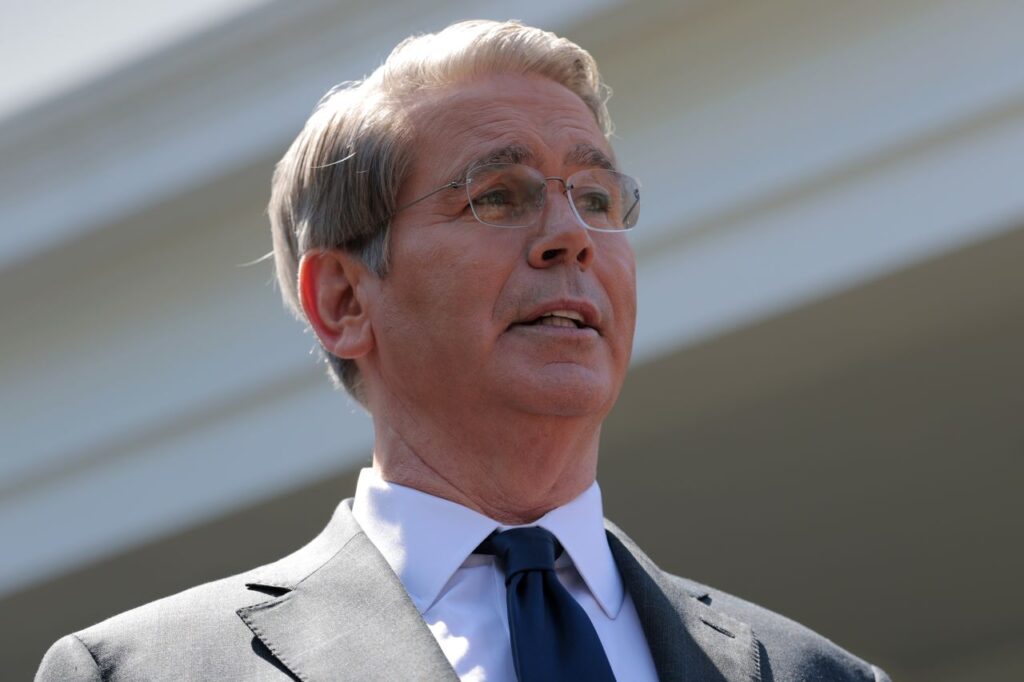The US and Kyiv have signed the minerals deal; an agreement to share profits and royalties from the future sale of Ukrainian minerals and rare earths.
This seals a deal that President Donald Trump has said will provide an economic incentive for the US to continue to invest in Ukraine’s defense and its reconstruction after he brokers a peace deal with Russia.
The minerals deal has been the subject of tense negotiations for months and nearly fell through hours before it was signed.
The final terms were far less onerous for Ukraine than those proposed initially by US Treasury Secretary, Scott Bessent in February, which included a clause that the US would control 100% of the revenues from the fund.
The deal will establish a US-Ukraine Reconstruction Investment Fund that the Trump administration has said will begin to repay an estimated $175bn in aid provided to Ukraine since the beginning of the war.
Ukraine’s first Deputy Prime Minister, Yulia Svyrydenko, confirmed in a social media post that she had signed the agreement. “Together with the United States, we are creating the fund that will attract global investment into our country,” she wrote.
The deal still needs to be approved by Ukraine’s parliament.
Ukrainian officials have divulged details of the agreement which they portrayed as equitable and allowing Ukraine to maintain control over its natural resources.
Ukrainian Prime Minister, Denys Shmyhal, said that the fund would be split 50-50 with between the US and Ukraine and give each side equal voting rights.

He stated that Ukraine would retain “full control over its mineral resources, infrastructure and natural resources,” and would relate only to new investments.
This means that the deal would not provide for any debt obligations against Ukraine, a key concern for Kyiv.
Shmyhal added that the deal would ensure revenue by establishing contracts on a “take-or-pay” basis.
In a post on Facebook, Svyrydenko gave further details of the fund, which she said would “attract global investment.”
She confirmed that Ukraine would retain full ownership of resources “on our territory and in territorial waters belong to Ukraine.” She added that it is the “Ukrainian state that determines where and what to extract.”
She noted that there would be no changes to ownership of state-owned companies.“They will continue to belong to Ukraine,” she said.
That included companies such as Ukrnafta, Ukraine’s largest oil producer, and nuclear energy producer Energoatom.
Svyrydenko stated that income would come from new licences for critical materials and oil and gas projects, not from projects which had already begun.
She said that income and contributions to the fund would not be taxed in the US or Ukraine “to make investments yield the greatest results.” Technology transfer and development were a “key” part of the agreement.
She said that Washington would contribute to the fund. “In addition to direct financial contributions, it may also provide new assistance – for example air defense systems for Ukraine,” she said.
Signal Of US’ Commitment To Peace Process

In a statement, Scott Bessent, the US Treasury Secretary, opined that this agreement signals clearly to Russia that the Trump administration is “committed to a peace process centered on a free, sovereign, and prosperous Ukraine over the long term.”
“President Trump envisioned this partnership between the American people and the Ukrainian people to show both sides’ commitment to lasting peace and prosperity in Ukraine.
“And to be clear, no state or person who financed or supplied the Russian war machine will be allowed to benefit from the reconstruction of Ukraine.”
Scott Bessent
Speaking at a town hall with NewsNation after the deal had been signed, Trump said that he told Ukrainian President, Volodymyr Zelenskyy during a recent meeting at the Vatican that signing the deal would be a “very good thing” because “Russia is much bigger and much stronger.”
Asked whether the minerals deal was going to “inhibit” Russian President Vladimir Putin, Trump said, “well, it could.”
READ ALSO: Ramaphosa Orders Probe Into Apartheid Case Delays



















